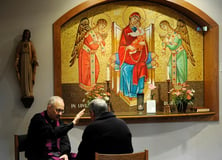Reconciliation
Penance, also called reconciliation, or confession, offers grace and the remission of sin to whoever receives it, and at whatever age. However, each person’s approach to reconciliation is very different, depending on age, stage of life, and development as a person. In fact, people adapt reconciliation to a particular milestone or stage of life rather than adapting themselves to reconciliation.
Today, Catholic children normally have their first reconciliation around the age of seven or eight. First confession was once a prerequisite for First Communion; today, that is no longer the case. Most theologians acknowledge that most children do not have serious sins to take care of before receiving the Eucharist. So children normally make their confession in second or third grade. Some parishes let the parents decide whether or not the children are ready. The criterion is that the child knows the difference between more serious and less serious sins.
The benefit of confession at a young age is that it establishes the habit of using the sacrament of Penance. After all, the Church requires regular confession. It is mandatory for all Catholics to confess once a year as part of the Easter season.
Sins may vary by age. A child may be more concerned with obedience; a teenager, with stealing and impure thoughts; an adult, with any one of the seven deadly sins (pride, greed, lust, anger, gluttony, envy, and sloth). Whatever the age, the sacrament of Penance demands a full examination of conscience preceding confession, a willingness to be completely open and honest during confession, true contrition, and an agreement to do penance and to amend one’s ways.
Penance can be therapeutic in the truest sense for children just as well as for teens and adults. This sacrament can truly bring healing to a person’s life by helping him or her regain a clear conscience, make amends, get some guidance, and start again.
A first reconciliation can be a memorable experience in a child’s life. Cognitively, children are able to learn the commandments and what is expected of them. They are also concerned with what is just and fair. However, it is in later years that, alongside the markers and milestones of adolescence and adulthood, reconciliation can be significant both in helping with problems and pressures and as an instrument of personal growth.
“Whose sins you forgive are forgiven them, and whose sins you retain are retained.” John 23:16
Reconciled to Right Relationship, Called to Heal and Restore
Those who approach the sacrament of Penance obtain pardon from God's mercy for the offense committed against him, and are, at the same time, reconciled with the Church which they have wounded by their sins and which by charity, by example, and by prayer labors for their conversion.

The Healing of the Sacrament of Reconciliation
“Bless me Father for I have. . . . ” Perhaps one of the hardest things we do is admit to our own wrongdoing. It’s hard to say that we have sinned—and be willing to turn our life around to avoid...
Struggling to Confess
Okay, so I’m slowly, painstakingly working on the NFP book — there’s a bunch of personal stuff going on, and also I sprained my ankle and now everything is taking about twice as much energy as...Confession times at Saint Joseph Catholic Church
SATURDAY
9:30 AM at the Church after Life and Mercy Mass
3:30 PM to 4 PM at the Church
or by appointment